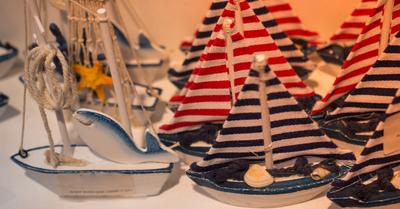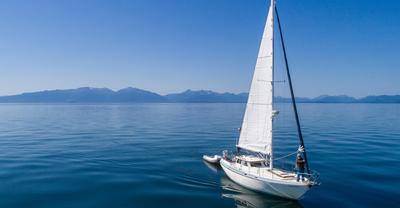Table of contents
15 Worst Sailing Superstitions Old Sea Dogs Have Ever Heard
Ever wonder why sailors look over their shoulders when they talk about the sea? It's not just the roar of the waves or the howl of the wind; it's the weight of centuries of seafaring lore that hangs heavy in the salty air.
Each creak of the ship's timbers may harbor omens, carrying tales of luck and peril from the mouths of grizzled sea dogs to your ears.
These are the superstitions that can make even the saltiest sailor's blood run cold, the kind that defines life on the rolling deep. Forget walking under ladders; out here, it's the unspoken fears, the rituals, and the eerie legends that rule the waves.
Let's navigate through the choppy waters of nautical myth.
1. Beware of the Lurking Shark
Spotting a shark following the ship is a sign of looming death, as these dangerous denizens of the deep are said to sense the demise of a sailor.
Modern understanding of shark behavior and advancements in maritime safety have debunked the notion that their presence foretells disaster.
Sharks are natural inhabitants of marine ecosystems and typically avoid large vessels.
2. Don't Change the Name of the Boat
A new name on the hull might bring new luck, right? Wrong. Changing a ship's name is a surefire way to sour her disposition and curse your voyage with bad fortune.
Today, changing a boat's name is a common practice and does not carry any supernatural implications.
3. No Bananas On Board
Bananas on a ship are an absolute no-go. These fruits are notorious for causing ships to lose their catch, and some fishermen say they're a magnet for misfortune.
The belief that bananas are unlucky at sea has no scientific basis.
4. No Women on Board
Women were often viewed as a distraction leading to calamitous outcomes. However, naked women were thought to calm the sea, thus the figureheads in their honor.
The exclusion of women from seafaring roles is based on outdated gender stereotypes and has no bearing on a ship's safety or luck.
5. No Whistling on Board
A jaunty tune can lift spirits, but whistling is an invitation to whistle up a storm, calling forth wind and tempest that could spell doom for the ship.
Whistling on board ships is now considered a harmless activity and has no supernatural consequences.
6. Red Sky At Night...
"Red sky at night, sailor's delight; red sky in morning, sailors take warning." Predicting weather is crucial at sea, and this adage is often eerily accurate.
Although the rhyme has some basis in meteorological science, it is not always accurate and should not be relied upon as the sole indicator of weather conditions.
7. Non-sailing Days
Setting sail on a Friday or the first Monday in April or the second Monday in August was asking for trouble.
Nowadays, sailors prioritize safety by assessing weather conditions, vessel readiness, and crew preparedness before embarking on a voyage, rather than adhering to arbitrary prohibitions based on historical events.
8. No Cats on Board
Cats were believed to bring bad luck if they crossed a sailor's path, especially if they jumped ship, as it was seen as a sign of impending disaster.
This superstition is considered bad advice today because it is based on unfounded beliefs and superstitions rather than empirical evidence.
9. Welcome the Lurking Dolphins
Dolphins swimming alongside a ship were seen as a sign of good luck and protection for sailors. Dolphins were believed to be benevolent creatures that guided and ensured a safe journey for seafarers.
While encounters with dolphins can be enjoyable for sailors, their presence should not be relied upon as a guarantee of safety or success at sea.
10. Son of A Gun
Births on board ships were considered auspicious events and were believed to bring good luck to the voyage. The term "son of a gun" originated from children born on the gun deck of a ship.
While births on board ships may have been celebrated in the past, modern maritime practices prioritize the safety and well-being of pregnant individuals.
Pregnant individuals are typically advised to avoid sailing during the late stages of pregnancy due to potential risks to their health and safety.
11. Deathly Lexis
Sailors believed that certain words or phrases spoken aboard a ship could have supernatural consequences. Uttering words related to death or doom was thought to invite misfortune or disaster.
While words can have power and influence, the idea that specific language can cause harm or alter fate is rooted in superstition rather than empirical evidence.
Today’s sailors prioritize clear communication and professionalism aboard ships, without attributing supernatural significance to spoken words.
12. Turning a Loaf of Bread Upside Down
It was believed that turning a loaf of bread upside down aboard a ship would invite hunger and malnutrition. This superstition reflected concerns about food scarcity during extended voyages.
There is no rational basis for the belief that turning a loaf of bread upside down would affect food supplies or nutrition aboard a ship.
Modern sailors prioritize proper provisioning and nutrition planning to ensure the health and well-being of the crew during voyages.
13. Stirring Tea with a Knife
Stirring tea with a knife aboard a ship was believed to stir up trouble and bring strife to the voyage. This superstition discouraged sailors from using knives for tasks unrelated to cutting or slicing.
There is no logical reason to believe that stirring tea with a knife would have any negative consequences for a voyage.
Modern sailors use utensils for their intended purposes without attributing supernatural significance to their actions.
14. No Farewell
Saying goodbye before a voyage was considered tempting fate and inviting misfortune. Sailors believed that leaving without farewells could increase their chances of returning safely from the voyage.
Today, farewells are an important part of human relationships and provide closure and emotional support before embarking on a journey.
15. Avoid Gingers
Redheads were believed to bring bad luck aboard a ship, and sailors were advised to avoid interacting with them or speaking to them before they spoke to you to avoid inviting trouble.
Prejudices against individuals based on physical characteristics such as hair color have no rational basis and are discriminatory.
Modern sailors prioritize diversity and inclusion aboard ships, recognizing the value of every crew member regardless of their appearance. Check out this video for a detailed explanation of the worst sailing superstitions.
The Impact of Superstitions on Sailors' Decision-Making Processes
The ocean is a vast, unpredictable place and it can be quite intimidating—even for the most seasoned sailors.
So, it's no wonder that over the centuries, those who braved the high seas clung to certain superstitions. But have you ever wondered how these old tales influenced the tough choices made aboard?
Superstitions aren't just stories; they were—and for some, still are—crucial elements guiding decision-making on the open ocean.
Picture this: a red sunrise might mean altering course to avoid impending bad weather, or the refusal to set sail on a Friday could delay a voyage. Yep, folklore at its finest had a real hand on the helm.
Let's chart out the influence these superstitions had on the choices made at sea.
You see, every decision informed by superstition shaped the narrative of the sailors, transforming folklore into a sea chart for both body and mind.
Frequently Asked Questions
Here are the FAQs on the worst sailing superstitions.
Are there any notorious taboos that sailors should never break?
Absolutely! Whistling up a storm isn’t just a phrase for sailors – it's a forbidden act that could quite literally call up a gale on some superstitious vessels. Another cursed no-no? Setting sail on a Friday.
What are some common omens that old sea dogs consider bad signs while at sea?
Keep your eyes peeled for the omens – a red sunrise could spell danger, warning sailors of peril, superstitious or not. If a hat falls overboard, be wary – it could mean your voyage might dive, too.
Can sailors overcome superstitions for the sake of safety?
Safety is always the North Star that guides a ship's crew, no matter what the superstitions say. After all, it's the 21st century – we have GPS and weather forecasting technology.











